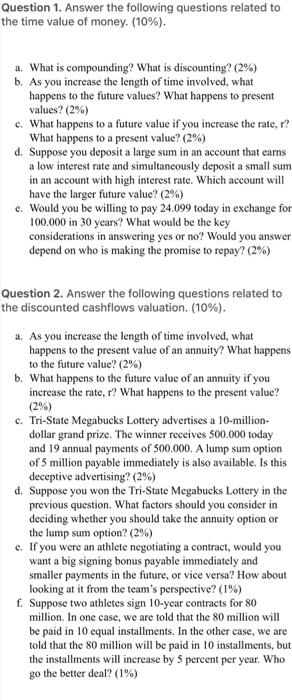Answered step by step
Verified Expert Solution
Question
1 Approved Answer
please answer and explain all parts to question 2 Question 1. Answer the following questions related to the time value of money. (10%). a. What
please answer and explain all parts to question 2 
Question 1. Answer the following questions related to the time value of money. (10%). a. What is compounding? What is discounting? (2%) b. As you increase the length of time involved, what happens to the future values? What happens to present values? (2%) c. What happens to a future value if you increase the rate, r? What happens to a present value? (2%) d. Suppose you deposit a large sum in an account that earns a low interest rate and simultaneously deposit a small sum in an account with high interest rate. Which account will have the larger future value? (2%) c. Would you be willing to pay 24.099 today in exchange for 100.000 in 30 years? What would be the key considerations in answering yes or no? Would you answer depend on who is making the promise to repay? (2%) Question 2. Answer the following questions related to the discounted cashflows valuation. (10%). a. As you increase the length of time involved, what happens to the present value of an annuity? What happens to the future value? (2%) b. What happens to the future value of an annuity if you increase the rate,r? What happens to the present value? (2%) c. Tri-State Megabucks Lottery advertises a 10-million- dollar grand prize. The winner receives 500.000 today and 19 annual payments of 500.000. A lump sum option of 5 million payable immediately is also available. Is this deceptive advertising? (2%) d. Suppose you won the Tri-State Megabucks Lottery in the previous question. What factors should you consider in deciding whether you should take the annuity option or the lump sum option? (2%) e. If you were an athlete negotiating a contract, would you want a big signing bonus payable immediately and smaller payments in the future, or vice versa? How about looking at it from the team's perspective? (1%) f. Suppose two athletes sign 10-year contracts for 80 million. In one case, we are told that the 80 million will be paid in 10 equal installments. In the other case, we are told that the 80 million will be paid in 10 installments, but the installments will increase by 5 percent per year. Who go the better deal? (1%) 
Step by Step Solution
There are 3 Steps involved in it
Step: 1

Get Instant Access to Expert-Tailored Solutions
See step-by-step solutions with expert insights and AI powered tools for academic success
Step: 2

Step: 3

Ace Your Homework with AI
Get the answers you need in no time with our AI-driven, step-by-step assistance
Get Started


